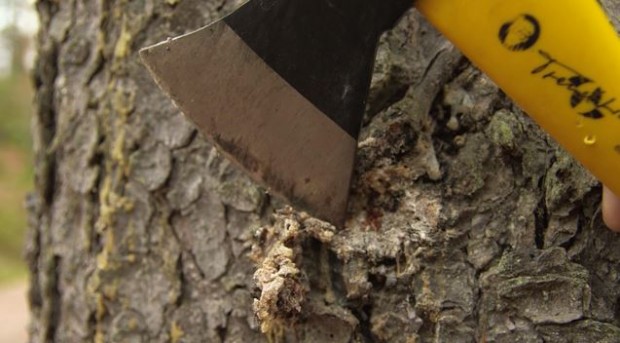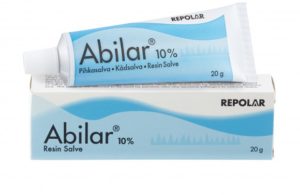Finnish spruce produces protective and nurturing ingredients also for human health

Case - Published 2.12.2015
Repolar Pharmaceuticals Ltd develops and manufactures products based on resin of a spruce tree. The resin of Norway Spruce (Picea abies) has proved in in vitro* studies to be strongly antimicrobial, anti-inflammatory and it contains components that enhance the skin re-epithelisation. The company’s first product Abilar 10% Resin Salve was launched in 2008 and it is the first Finnish CE-mark registered product that is based on a natural active ingredient. Over the years Repolar has continued the product development and today the company has a portfolio of seven products and a completely new technology that enables use of resin components in aqueous solutions.
The evolution of plants and trees has been ongoing over millions of years. This persistent development of natural products has created hundreds of chemical compositions that presumably have significant biological function and effect. In its studies Repolar has been able to prove the functionality and efficacy of the active ingredients in the callus resin for human and veterinary health. The products based on comprehensive laboratory and clinical studies are used for example in treatment of complex wounds that are hard to heal. The company has developed a technology that enables manufacturing of products that fulfill the requirements of EU Medical Devices directive.
 Resin is a renewable and active natural component
Resin is a renewable and active natural component
The aggressive environment where coniferous trees are growing demands simple and effective defense mechanisms. The resin of a spruce tree is a great example of this kind. In the comprehensive in vitro studies Repolar has shown spruse resin to be strongly antimicrobial with broad spectrum and also anti-inflammatory. Resin is antimicrobial against bacteria, fungi, yeast and potentially mold. The method of function is not specific and the microbes cannot develop resistance against it, but this also means that the resin is effective against the resistant bacterial strains, like MRSA or VRE. Ongoing research and development work of Repolar focuses on the anti-inflammatory effects of the resin.
High value residues from the forest
Knowledge and utilisation of the active ingredients in trees enhance the value of forest and returns of the forest owner. It is highly important for the new bio-economy not to underestimate or waste these components as low value residues. In the current processes Repolar uses raw material collected from living trees purifying it to be used in end products designed for human and veterinary health. This value chain engages resin collectors and directly several persons in research, development and manufacturing. The final products have gained a stable position in Finnish market with strong global potential and growth opportunity. To serve the global demand in new sectors the old and new bio-economy should find common approaches to develop the value chains. With innovative approaches the traditional forest companies and new growth companies can develop value chains that combines cost effective supply chain and novel valued added products.
*In vitro (literally “in glass”) is a research technique where the experiments with microorganisms, cells or biological molecules are performed outside their normal biological context such as test-tubes, flasks of petri dishes.
Additional information:
CEO Miika Jokinen, Repolar Pharmaceuticals Ltd
tel. 040 0515618, miika.jokinen(at)repolar.com
Published in english: 2 December, 2015
